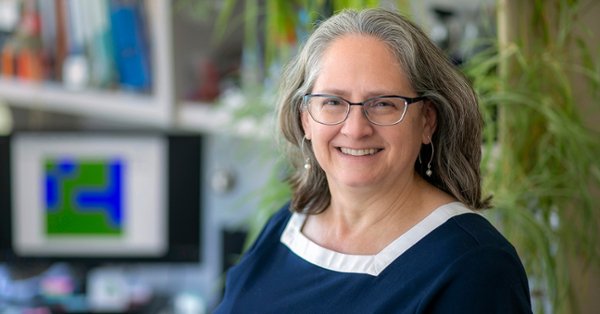Rowan University biologist elected as 2023 AAAS Fellow
Rowan University biologist elected as 2023 AAAS Fellow

The American Association for the Advancement of Science (AAAS) Council has elected marine biologist and professor Courtney Richmond, Ph.D., as a 2023 Fellow.
A professor in the Department of Biological & Biomedical Sciences and faculty member since 2001, Richmond is only the second professor in Rowan University’s 101-year history to join the association’s Fellows list. The first, in 1946, was George Haupt, a professor of science who published extensively on science education.
In existence since 1848, the association was the first permanent organization formed to promote the development of science and engineering at the national level. Publisher of the journal, Science, it’s now the world’s largest multidisciplinary scientific community with members in 91 countries.
One of 502 members elected in 2023, Richmond was honored for her contributions to the field of ecological modeling and marine invertebrate biology.
“The American Association for the Advancement of Science is the premier scientific organization in the United States,” said Stephen Bentivenga, professor and head of the Department of Biological & Biomedical Sciences in the College of Science & Mathematics. “Dr. Richmond’s election as a Fellow highlights her superb reputation as a scientist and her significant contributions to science education. The Department of Biological & Biomedical Sciences is lucky to have her on the faculty.”
Richmond said her election came as a surprise until she learned the association is working to diversify its ranks.
“There are lots of different, awesome ways to be scientists,” Richmond said. “I very intentionally decided to go into science education, in addition to continuing to be a practicing scientist. A lot of the way that I wanted to contribute to science was by inspiring future generations of scientists, both in the classroom and in the lab.”
Since she was a college student learning how to navigate the ocean using only the sun, moon and stars to guide her, Richmond has focused much of her research on the microscopic creatures living at the bottom of the food web—great masses of zooplankton in oceans, rivers and lakes. Because they support larger animals, even small changes affecting their populations can have an outsized impact on the rest of their ecosystem.
To better understand and predict those impacts, Richmond builds computer models to run “what-if” scenarios, “especially questions involving environmental stress and environmental change, including both natural and human-influenced changes.” The models allow Richmond to run experiments “in silico” that can’t be conducted in real life, to project what could happen in the future under particular conditions.
Now on sabbatical, the self-taught coder is collaborating with Tatyana Rand, Ph.D., an ecologist with the U.S. Department of Agriculture’s Agricultural Research Service, to understand how to manage pests attacking wheat crops in the grasslands of northeastern Montana, without using pesticides.
One of Richmond’s virtual experiments found that wheat crops under attack by the wheat stem sawfly will remain infested, even if essentially all of the adult sawfly population is killed—a finding that matched anecdotal reports by frustrated farmers.
Though previously unfamiliar with insects or agricultural practices, Richmond is deploying her methods on data from Rand and other researchers to develop new approaches, including controlling crop pests using their natural parasites.
“We’re using a computer model to try to figure out if we can manage the wheat stem sawfly based on where you plant different kinds of crops across the landscape, and how often you rotate the crops in each field,” Richmond said.
Her work in Montana may be far removed from her usual interests, but Richmond’s research is perennially driven by “what if” questions about how individuals, populations, communities and ecosystems interact.
A lot of it, she said, is about how to accomplish certain goals “while not creating other problems in the environment.”
“I think we have now recognized that maintaining biodiversity can have incredibly important economic effects and benefits, in addition to the environmental benefits,” Richmond said.
Richmond will be recognized along with the rest of the 2023 Fellows at the ceremonial Fellows Forum during the AAAS Annual Meeting in September where she will be presented with a certificate and a blue-and-gold rosette for the lifetime honor.